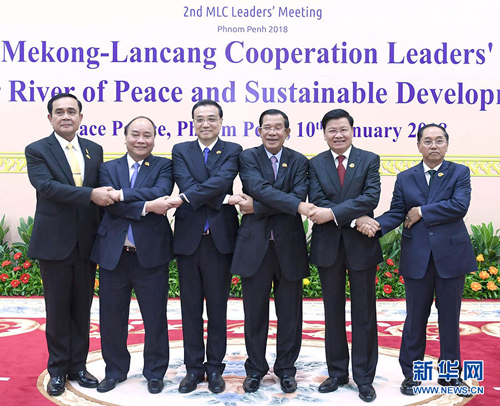Li Keqiang Attends the 2nd LMC Leaders' Meeting, Stressing to Forge the Economic Development Belt Along the Lancang-Mekong River Basin and Build a Lancang-Mekong Community of Shared Future

On the afternoon of January 10, 2018 local time, Premier Li Keqiang attended the 2nd Lancang-Mekong Cooperation (LMC) Leaders' Meeting at the Peace Palace in Phnom Penh. Li Keqiang and Prime Minister Hun Sen of Cambodia co-chaired the meeting. Prime Minister Thongloun Sisoulith of Laos, Prime Minister Prayut Chan-o-cha of Thailand, Prime Minister Nguyen Xuan Phuc of Vietnam and Vice President U Myint Swe of Myanmar were present.
Li Keqiang expressed that the LMC is the first and a new type of sub-regional cooperation mechanism jointly established by the six countries along the Lancang-Mekong River and an important platform for extensive consultation and joint construction of the "Belt and Road". Over the past two years, as we have upheld the cooperation concepts featuring development first, equal consultation, practicality and high efficiency as well as openness and inclusiveness, the LMC mechanism has produced better-than-expected progress. We forged the LMC pattern featuring leaders' guidance, all-round coverage and broad participation, created the LMC speed of daily progress, monthly results and yearly updates as well as cultivated the LMC culture featuring equal treatment, sincere mutual assistance and family-like atmosphere.
Li Keqiang pointed out that the LMC has become one of the most dynamic and productive cooperation mechanisms in the region. China is willing to work with the countries along the Mekong River to forge the economic development belt along the Lancang-Mekong River basin and build a Lancang-Mekong community of shared future. Li Keqiang put forward the following proposals regarding advancing the LMC from the nurturing period to the growth period in a smooth manner and forging a model of sub-regional and South-South cooperation.
First, well implement water resource cooperation. The six countries must trust, understand and support each other, strengthen upstream and downstream cooperation, accommodate each other's concern, and properly handle the relations between economic development and environmental protection in a coordinated way. With the focus on sustainable utilization of water resources, we must map out a "five-year action plan for water resource cooperation", enhance emergency management on droughts and floods, carry out joint researches on water resources and influence of climate change, improve water quality monitoring system and forge a water resource cooperation platform featuring joint construction and shared benefits.
Second, reinforce production capacity cooperation in such areas as the construction of water conservancy facilities. China boasts cost-effective hydroelectric power equipment as well as engineering construction force, which suit the needs of the countries along the Mekong River. China encourages its companies to, in line with the concept of sustainable development, participate in the construction of hydropower stations, reservoirs, irrigation and drinking-water projects in the countries along the Mekong River so as to achieve win-win cooperation. The six countries must well implement the Joint Statement on Production Capacity Cooperation Among Lancang-Mekong Countries, make plans for connectivity among Lancang-Mekong countries and action plans for production capacity cooperation among Lancang-Mekong countries, and well build the existing economic and trade cooperation zones and cross-border economic cooperation zones.
Third, expand agricultural cooperation. China supports its enterprises in carrying out cooperation in the deep processing of agricultural products in the countries along the Mekong River and jointly developing third-party markets. China is willing to, together with the countries along the Mekong River, deepen cooperation in agricultural technology and build platforms for agricultural technology exchanges, joint research as well as investment and trade cooperation.
Fourth, upgrade human resource cooperation. China is willing to help the countries along the Mekong River nurture more professionals at all levels that are desperately needed for development. China will offer short-term training and in-service education for 2,000 people for the countries along the Mekong River and 100 four-year scholarships for undergraduates in 2018. China encourages joint training programs among universities and promotes cooperation among vocational schools.
Fifth, push forward medical and health cooperation. China is willing to set up joint prevention and control mechanisms for infectious diseases with relevant countries, carry out cross-border joint prevention and control projects for infectious diseases in an in-depth way, and build a Lancang-Mekong network for malaria elimination, so as to effectively safeguard health security in this region. China will assist relevant countries in building medical health system.
Li Keqiang suggested that the six member countries should, on the basis of consolidating the "3+5 cooperation framework", expand cooperation in such areas as digital economy, environmental protection, health, customs and youth, so as to gradually form "3+5+X cooperation framework". China's development benefits from a sound surrounding environment and also serves as a source of driving force and a stabilizer for the economic growth of neighboring countries. The 19th National Congress of the Communist Party of China convened not long ago stressed that China will follow a peaceful development path and promote the building of a community with a shared future for mankind. China's development will definitely bring the earliest and most benefits to the neighboring countries, especially to the countries along the Mekong River. China is willing to take joint actions with relevant countries to cultivate the seedling of the LMC into a towering tree and open up a brighter future for sub-regional cooperation. As the meeting is held in Phnom Penh, it is believed that our cooperation results in the future will be definitely shining as gold.
Leaders present at the meeting praised that the proposals put forward by Premier Li Keqiang suit the long-term interests of the countries along the Mekong River, thanked China's support and assistance to the development of the five countries and believed that the LMC mechanism, though established not long ago, has yielded fruitful results and showcased a broad cooperation prospect featuring good-neighborliness and friendliness as well as mutual benefit and win-win results. With the political willingness to reinforce cooperation and economic complementary advantages, the five countries stand ready to accelerate the LMC to constantly grow from strength to strength as well as enhance cooperation in such fields as water resources, connectivity, agriculture and people-to-people and cultural engagement, in a bid to boost peace, stability and sustainable development of the region.
The Five-Year Plan of Action of the Lancang-Mekong Cooperation (2018-2022) and the Phnom Penh Declaration of the Second Lancang-Mekong Cooperation Leaders' Meeting were issued at the meeting.
After the meeting, Li Keqiang and leaders of other countries jointly attended the handover ceremony of the succession of Laos as the next co-chair of the LMC.
